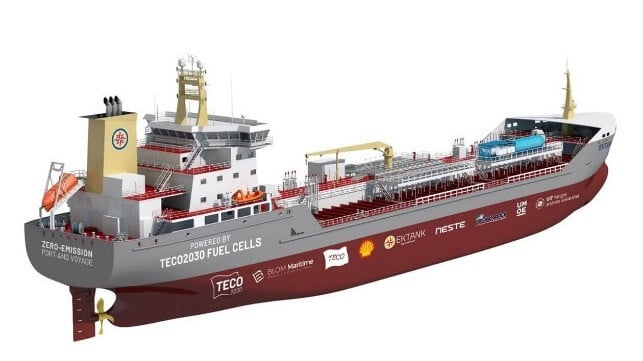Fuel Cell Pioneer Teco 2030 Files Bankruptcy as Industry Investment Slows

Norway’s pioneering fuel cell company Teco 2030 which was seen as a leader in maritime fuel cell applications confirmed in a stock exchange that the company is insolvent. The collapse began last month with the bankruptcy of segments of the business which now cites the lack of investor support for the broader hydrogen industry for its demise.
“The board of directors of the company has this evening decided to file for bankruptcy. The board decision is unanimous and is due to the fact that there is no longer a realistic opportunity to raise sufficient capital to continue operations,” Teco 2030 wrote in a brief filing with the Oslo Borse late on December 10.
The company is reported to have lost nearly $30 million since it was spun off as an independent company from Teco Marine Group in 2021. It was started in 2019 with a focus on marine applications of fuel cells and won important grants and several early projects. It had produced the first demonstration models of its stack design for PEM hydrogen fuel cells.
Teco 2030 was to participate in the conversion project launched in 2024 exploring Samskip’s 2015-built vessel Samskip Kvitnos, a 4,900 dwt RoRo cargo vessel, slated for the addition of hydrogen propulsion. The company had also signed a letter of intent in 2023 with Pherousa Green Shipping to develop and supply fuel cells for new generation bulkers.
“We are incredibly sad for everyone in the group who has lost their jobs, and those who have supported us financially who are losing theirs. But it comes to a point where we have turned over every stone,” CEO Tore Enger told the Norwegian media outlet E24.
Enger said Teco 2030’s challenges were indicative of a wider slowing of support for the entire hydrogen and green sector. He told reporters that investment had come to a halt across Norway and Europe in green projects. He said interest had declined from both private investors and states. Teco 2030 he said would require at least $35 million more in investment to get its factory running.
He said the market has slowed for the industry and that states are not providing enough support to drive the development of the technology. He highlighted others including Equinor that has also scaled back on its green programs.
Norway’s Tax Administration had moved with bankruptcy proceedings against several of the company’s subsidiaries in late October and early November. At the time, the parent company said it was limited to those companies but as the issues spread last month it called it a “sensitive time.”
Teco 2030 had struggled for much of 2024 with declining finances. It had announced a reorganization plan, but media reports said at times the company was only able to pay 75 percent of employees’ salaries. Creditors include the property owners of its offices and production facility in Narvik. The leaseholder had called a corporate guarantee on the lease when the subsidiary was unable to pay.
